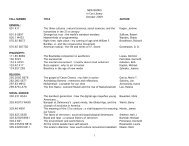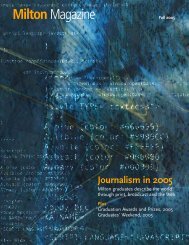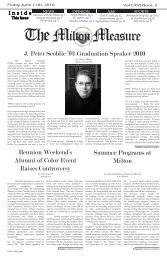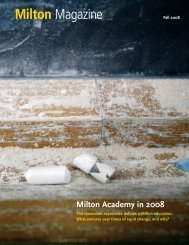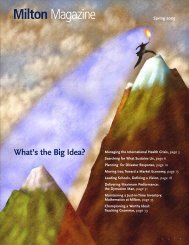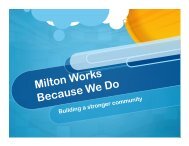Spring 2007 - Milton Academy
Spring 2007 - Milton Academy
Spring 2007 - Milton Academy
- No tags were found...
Create successful ePaper yourself
Turn your PDF publications into a flip-book with our unique Google optimized e-Paper software.
Reflection is a luxury that requires somedistance, and Doug was immersed inDeval’s candidacy from when it was merelyan idea to when he became governorelect.“It’s hard to fund raise for someonewho hasn’t officially declared yet,” Dougremembers. He did, however, and then lefthis job as a financial analyst with SeanJohn Menswear to work with other membersof the earliest campaign team.Doug was the utility infielder, with specialtyareas that included connecting withand rallying minority and religious constituencies,but which also included fundraising—the task he found most difficult—especially after Steven transitioned toCalifornia.“At the beginning of the campaign, Iworked on getting the minority communitybehind Deval,” Doug says. “I’d beenaway from Massachusetts for 11 years, butI started meeting with political activistsand community leaders. One of Deval’smajor challenges was lack of name recognition;the other was lack of money.”Doug had worked hard during the Kerrycampaign, registering Latino voters inPhiladelphia and Allentown, Pennsylvania.“My number one goal is to improve theLatino community in this country,” Dougmakes clear. The Latino community inMassachusetts didn’t know Doug: “‘You’rea New Yorker,’ they said,” Doug recalls.“But I didn’t have any baggage, either.Why should Latinos care? Latinos havebeen ignored by Democrats, becauseDemocrats think they have us, and courtedby Republicans, who forget about us assoon as they win.”Doug found the people he met tired ofRomney and hungry for fresh air—achange. With the emotional power of personalexperience, Doug introduced Devalto them: “Deval was a father to me, a mentorto me, he was hard on me. He caresabout everyone. He cares about justice—he’s proved that in his work. He isn’t perfect,but he’s amazing, brilliant, the kindof person any state and this countryneeds.”The June 2005 “issues convention” ofdelegates was the beginning of the breakthroughin name recognition. “Campaignleaders Nancy Stoleberg and John Walshdid a great job getting political activistsfrom around the state to know Deval,”14 <strong>Milton</strong> MagazineDoug claims. “We already had hundreds ofstudent volunteers and campaign leaders,and those two had them all wear neongreen tee shirts with Deval Patrick acrossthe front. They were everywhere”; Dougsays, “they were the buzz. Deval’s speechwas electrifying. By the end of it the wholeconvention was screaming with him ‘Yes,we can.’”The campaign viewed its flotilla of collegeinterns as a key resource, and made effortsto make sure they were valued and felt likea part of something big, including settingup speakers for them, like MichaelDukakis. They put the students to work onvisibility, at intersections, on bridges, incenters of towns. “We were a year and ahalf away from an election, and still theywere out there,” says Doug. “Nancy andJohn wanted to build name recognition,and they were right. Deval has always beengreat at getting skilled people around him.”People were energized; still, the summerof 2005, particularly September, was difficult:Spending threatened to outpace fundraising.Money eventually began to comein and the campaign was able to opensatellite offices in Dorchester and in<strong>Spring</strong>field, which has a large communityof color. “That made it easier for me tobring in volunteers of color,” Doug says.“Although some came, going to the mainheadquarters in Charlestown was a challengefor many.”After the convention, Doug added twoother constituencies to his list: unionactivists (not the elected leaders) and thefaith community (clerics). “I don’t agreewith Deval on this or on that,” Doug saysthey responded, “but overall I like what hesays.” He continued with the Latino communities,especially in Worcester,Lawrence and Fall River, and worked withthe African-American community, too.“Many white progressive liberals, and evensome white conservatives, were onboardright away,” Doug remembers. “It took theAfrican-Americans and Latinos longer.African-Americans didn’t know him andasked, like others, what Deval had done forthem. They were skeptical that the whitecommunity would elect a black governor.My answer to them was ‘we need yourhelp. Get involved.’”“‘Go to the Web site,’ I said, ‘go to anevent; meet the man; give him a chance.’”Deval, John Walsh and strategist DougRubin were responsible for the campaigntone; race wasn’t going to be the centralissue. “Deval was glad when someone inthe audience brought the race questionup,” Doug recalls. “‘I am a black man,’ hewould say. ‘If people have a problem withthat, it’s their problem, not my problem.’”Between the primary and the general election,Doug focused on the Spanish-speakingmedia, newspapers and radio stations,going on for interviews after an initialinterview with Deval. “Almost all endorsedDeval—Siglo 21, El Planeta, El Vocero,” saysDoug. El Mundo, a traditionally conservativepaper, did not officially endorse him,but clearly stated that the Republican candidatedid not deserve the Latino community’svote.“Besides getting good, smart peoplearound him, Deval is a great listener,”according to Doug. “Being a great listeneris the key to being a great leader. He listensto everyone. Usually I like to talk—ata meeting, or any kind of gathering—butnow I find myself listening a lot more, andI learn so much. I was humbled by thewhole experience.”Janet Lin ’97“Well, I’m excited about this job and terrified,but the two people I work for areextraordinary leaders and mentors, DanO’Connell and Deval Patrick,” says JanetLin. She’s in her second day as chief ofstaff for Mr. O’Connell, the newly appointedsecretary of housing and economicdevelopment.“The governor has elevated the status ofaffordable housing and economic developmentby combining them both in this newsecretariat. Labor and workforce issues,typically folded in to housing and economicdevelopment, are another secretariat.This is revolutionary thinking and structure,to define economic development interms of the quality of life that skilledworkers in Massachusetts should expect,including being able to afford housing,”Janet explains.“I staffed fund-raisers along with StevenClarke, and people would ask, ‘What areyou going to do about population loss inMassachusetts?’ This secretariat is a directresponse to that concern.



